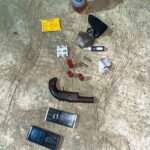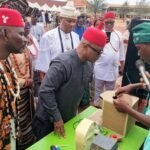Flowerbudnews
The Court of Appeal sitting in Abuja has discharged and acquitted a pharmacist, Abubakar Mustapha Danraka, earlier sentenced to life imprisonment by a High Court of the Federal Capital Territory (FCT) upon conviction for rape.
A three-member panel of justices, in a lead judgment by Justice Joseph Oyewole, held that the prosecution failed to prove its case with credible evidence as required by law.
Justice Oyewole, who found that the case was poorly investigated, picked holes in the findings and decision of the lower court and proceeded to set aside the order.
It will be recalled that Danraka, a Special Adviser to the Director General of the National Institute for Pharmaceutical Research Development (NIPRD), Abuja, was alleged to have raped a 12-year-old boy who is a neighbour between March 20 and March 21, 2020.
Danraka was alleged to have raped the boy (names withheld) by intentionally penetrating the victim’s anus with his penis.
The prosecution alleged that the incident occured at Spring Valley Estate, Airport Road, Abuja.
He was arraigned on April 5, 2022 on a one count charge marked: FCT/HC/CR/014/2022.
The charge was preferred against him by National Agency for the Prohibition of Trafficking in Persons (NAPTIP).
The defendant, however, denied the allegation by pleading not guilty.
To prove its case, the prosecution called four witnesses during trial, while the defendant called three witnesses, including himself.
Justice Asmau Akanbi-Yusuf, in a judgment on September 18, upheld the case of the prosecution, convicted Danraka and sentenced him to life imprisonment.
Dissatisfied with the judgment, he appealed at the Court of Appeal in Abuja in the appeal number::CA/ABJ/CR/1019/2023.
Justice Oyewole, in the judgment delivered on July 15, 2024, and was made available to newsmen on Friday in Abuja, held that the trial court was wrong to have admitted the victim’s extra judicial statement as part of the prosecution’s evidence.
He also held that the prosecution was wrong not to have investigated the alibi raised by Danraka.
Justice Oyewole equally faulted the medical report of a doctor, Dr. Denni Richard Shettima of the Nation’s Hospital, Abuja, who examined the alleged victim, for not equally subjecting the defendant to medical scrutiny.
“The only eye-witness to the commission of the said rape was the victim, who testified as PW2 (the victim) at the trial.
“His testimony failed to specifically state that he was raped or penetrated by the appellant.
“In convicting the appellant however the lower court relied on the extra judicial statement of the same PW2 tendered through PW1 (the investigating police officer – IPO) by the prosecution.
“This was an error as the lower court failed to take cognizance of the clear provisions of sections 232 and 233 of the Evidence Act 2011.
“The said extra judicial statement of PW2 was inadmissible for the purposes for which the lower court admitted it and in relying on the said extra judicial statement for evidence to convict the appellant, the findings which emanated therefrom were not only perverse but had occasioned miscarriage of justice.
“As earlier stated, the extra judicial statement of a witness is not to be tendered in evidence and used as additional evidence against the criminal defendant or accused person, it can only be used to resolve contradictions in the testimony of the witness.
“It follows therefore that a court cannot rely on inadmissible evidence to arrive at its decision.
“The medical doctor who examined PW2 testified as PW4 (the medical doctor) and his evidence was assessed by the lower court as providing needed corroboration for the content of exhibit C, the wrongfully admitted extra judicial statement of PW2.
“On his own, the said PW4 did not examine the appellant although he (the appellant) was readily available at the earliest opportunity.
“His (the medical doctor’s) testimony therefore did not link the appellant with the offence.
“Also, his testimony cannot be corroborated or provide corroboration for the wrongfully admitted exhibit C.
“The absence of legally admissible evidence of penetration by the appellant and the absence of any examination of the appellant by PW4 rendered the evidence of the said PW4 worthless before the court.
“The situation of the respondent was only further exacerbated by the failure to investigate the alibi of the appellant which was raised at the earliest opportunity as contained in exhibit B,” he said.
Justice Oyewole held that the evaluation of the issue of alibi of the appellant by the lower court and the method of investigation by the investigators created an unacceptable impression that the appellant did not enjoy a presumption of innocence under section 36 (5) of the Constitution and that he had the duty of proving his own innocence.
He added: “This must never happen in a criminal trial especially one where the appellant faced the punishment of life imprisonment.
“It is a constitutional imperative that investigators approach their task with an open mind which permits of the possibility that the person brought before them as the alleged offender may be innocent.
“That way every piece of Investigative lead would be adequately covered without any iota of bias.
“In line with the provisions of section 36 (5) of the Constitution that where doubts arise in the case presented by the prosecution then such doubts should be resolved in favour of the accused person or criminal defendant.
“The highlighted doubts in the case of the respondent herein must enure to the benefit of the appellant.
“In totality therefore, I find merit in this appeal and I hereby allow it.
“Consequently, the judgment of the lower court delivered in Suit No. FCT/HC/CR/014/2022 delivered on the 18” September, 2023 is hereby set aside.
“I equally set aside the conviction and sentence of the appellant and instead, the appellant is hereby discharged and acquitted,” Justice Oyewole said.
Justices Peter Obiorah and Okon Abang, who are members of the panel, also agreed with the lead judgment.










